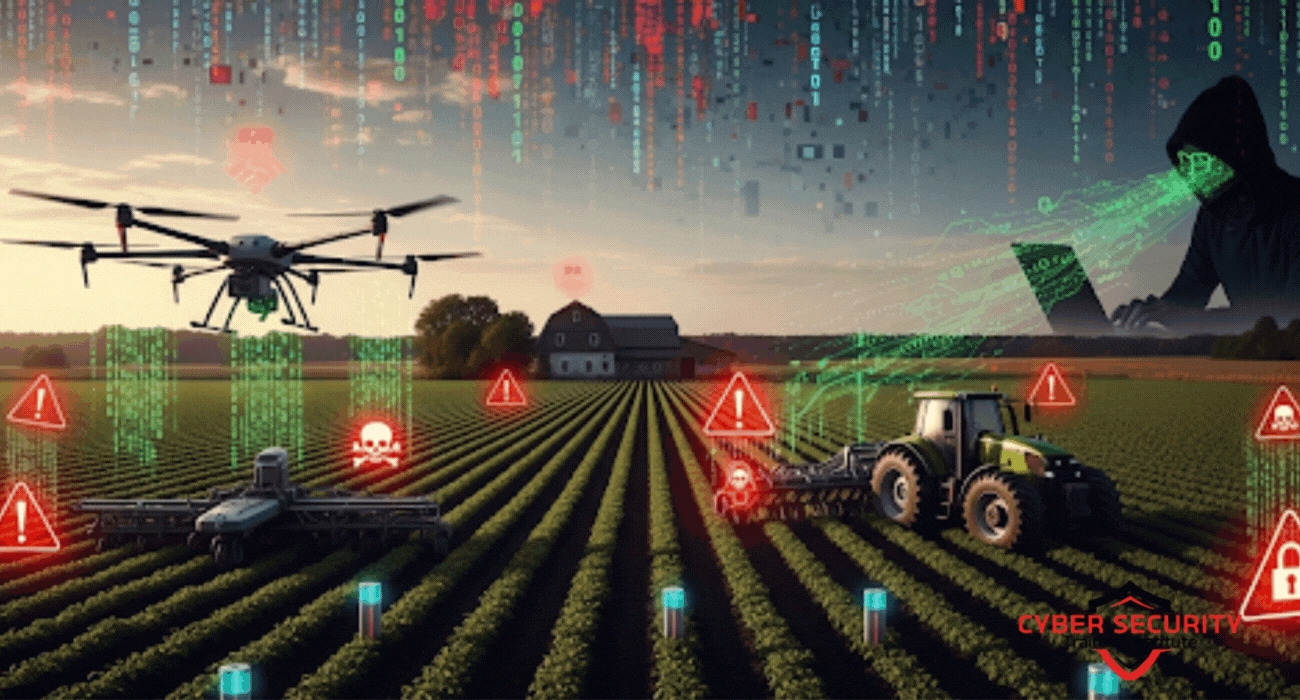From Farms to Firewalls | How Farmers Are Being Targeted by Cyber Criminals
In the heart of rural landscapes, where fields stretch wide and crops sway under the sun, a new threat is emerging—one that doesn’t involve pests or drought but something far less visible: cybercrime. Farmers, who have long relied on hard work and traditional tools, are now finding themselves in the crosshairs of cybercriminals. As agriculture becomes more connected through technology, from smart tractors to cloud-based farm management systems, the risks of cyberattacks are growing. This blog explores how farmers are being targeted, the methods cybercriminals use, and what can be done to protect the backbone of our food supply.

Table of Contents
- The Digital Revolution in Agriculture
- Why Farmers Are Targets
- Common Cyber Threats Facing Farmers
- Real-World Examples of Cyberattacks in Agriculture
- Protecting Farms from Cybercrime
- The Role of Education and Awareness
- Conclusion
- Frequently Asked Questions
The Digital Revolution in Agriculture
Agriculture has come a long way from the days of manual plows and handwritten ledgers. Today, farmers use advanced technologies to boost productivity and efficiency. From GPS-guided tractors to drones monitoring crop health, the industry has embraced the Internet of Things (IoT), cloud computing, and data analytics. These tools help farmers make data-driven decisions, optimize yields, and reduce waste.
However, this digital transformation comes with a catch. The more connected a farm becomes, the more vulnerable it is to cyber threats. Devices like smart sensors, automated irrigation systems, and even livestock trackers are often linked to the internet, creating entry points for hackers. While these technologies make farming smarter, they also make it a target for those looking to exploit weaknesses in digital systems.
Why Farmers Are Targets
Farmers might seem like unlikely targets for cybercriminals, but several factors make them appealing:
- Limited Cybersecurity Awareness: Many farmers are experts in agriculture but may not be familiar with cybersecurity best practices, making them easier targets.
- Valuable Data: Farms generate sensitive data, such as crop yields, financial records, and supply chain details, which can be sold or exploited.
- Critical Infrastructure: Agriculture is a cornerstone of the economy, and disrupting it can have widespread consequences, attracting cybercriminals with malicious intent.
- Weak Security Systems: Small farms often lack the budget for robust cybersecurity, leaving their devices and networks exposed.
Cybercriminals see these vulnerabilities as opportunities, whether they’re after financial gain, data theft, or simply causing chaos.
Common Cyber Threats Facing Farmers
Farmers face a range of cyber threats, each with the potential to disrupt operations or cause financial loss. Here are the most common ones:
| Threat | Description | Impact |
|---|---|---|
| Phishing | Emails or texts that trick farmers into sharing sensitive information or clicking malicious links. | Loss of personal or financial data, malware installation. |
| Ransomware | Malware that locks farm systems or data, demanding payment to restore access. | Disrupted operations, financial loss, data exposure. |
| IoT Device Attacks | Hackers exploit vulnerabilities in smart farm equipment like tractors or sensors. | Equipment malfunctions, data theft, operational downtime. |
| Data Breaches | Unauthorized access to farm management systems or cloud platforms. | Exposure of sensitive business or customer data. |
These threats can hit farmers hard, especially when they rely on technology for daily operations. A single attack can halt planting schedules, disrupt supply chains, or lead to significant financial losses.
Real-World Examples of Cyberattacks in Agriculture
Cyberattacks on agriculture are not just theoretical—they’re happening now. Here are a few examples:
- Ransomware on Agribusiness: In 2021, a major U.S. grain cooperative was hit by a ransomware attack, disrupting operations at multiple facilities. The attackers demanded millions to unlock critical systems, causing delays in grain processing and distribution.
- Phishing Scams Targeting Farmers: Farmers have reported receiving fake emails posing as suppliers or agricultural agencies, tricking them into sharing bank details or downloading malware.
- Hacked IoT Devices: In 2022, a farm in Europe had its automated irrigation system hacked, causing overwatering that damaged crops. The attacker exploited a weak password on the system’s control panel.
These incidents highlight the real-world consequences of cybercrime in agriculture. They’re not just inconveniences—they can threaten livelihoods and food security.
Protecting Farms from Cybercrime
Farmers don’t need to be tech experts to protect themselves, but they do need to take proactive steps. Here’s how:
- Use Strong Passwords: Create complex passwords for all devices and accounts, and change them regularly. Consider using a password manager to keep track.
- Update Software: Keep farm management apps, IoT devices, and computers updated to patch security vulnerabilities.
- Be Wary of Emails: Avoid clicking links or sharing information in unsolicited emails or texts. Verify the sender’s identity before taking action.
- Secure Networks: Use encrypted Wi-Fi networks and consider a virtual private network (VPN) for added security.
- Backup Data: Regularly back up critical data to an offline or secure cloud storage system to minimize losses from ransomware.
- Invest in Cybersecurity Tools: Affordable antivirus software and firewalls can provide a strong defense against malware and hackers.
Implementing these measures can significantly reduce the risk of cyberattacks, helping farmers focus on what they do best—growing food.
The Role of Education and Awareness
One of the biggest challenges in protecting farmers from cybercrime is awareness. Many farmers are unaware of the risks or assume they’re too small to be targeted. Education is key to changing this mindset. Agricultural organizations, cooperatives, and governments can play a role by offering:
- Workshops and Training: Simple, practical sessions on spotting phishing emails or securing devices.
- Resources for Small Farms: Free or low-cost cybersecurity guides tailored to agriculture.
- Partnerships with Tech Companies: Collaborations to provide affordable security solutions for farmers.
By empowering farmers with knowledge, the industry can build a stronger defense against cyber threats.
Conclusion
The rise of technology in agriculture has brought incredible benefits, but it has also opened the door to cybercriminals. From phishing scams to ransomware, farmers face a growing array of threats that can disrupt their operations and livelihoods. By understanding these risks, adopting simple security measures, and prioritizing education, farmers can protect their farms from digital dangers. The future of agriculture depends not just on fertile soil and good weather but also on strong firewalls and cyber awareness. Let’s work together to keep our farms safe, both in the fields and online.
Frequently Asked Questions
Why are farmers targeted by cybercriminals?
Farmers are targeted due to their valuable data, limited cybersecurity knowledge, and reliance on connected technologies, making them vulnerable to attacks.
What is phishing, and how does it affect farmers?
Phishing involves fake emails or texts tricking farmers into sharing sensitive information or downloading malware, leading to data theft or system damage.
Can small farms be targeted by cybercriminals?
Yes, small farms are often targeted because they may lack robust cybersecurity measures, making them easier prey for hackers.
What is ransomware, and how can farmers avoid it?
Ransomware locks systems or data until a ransom is paid. Farmers can avoid it by backing up data, updating software, and avoiding suspicious links.
How do IoT devices make farms vulnerable?
IoT devices like smart tractors or sensors can be hacked if not properly secured, allowing attackers to disrupt operations or steal data.
What data do cybercriminals want from farmers?
Cybercriminals seek crop yield data, financial records, customer information, and supply chain details, which can be sold or used for fraud.
How can farmers spot a phishing email?
Look for suspicious sender addresses, urgent demands, or unexpected attachments. Verify the sender before clicking links or sharing information.
Are there affordable cybersecurity options for small farms?
Yes, affordable antivirus software, password managers, and free educational resources can help small farms improve their security.
What should farmers do if they suspect a cyberattack?
Disconnect affected devices from the internet, contact a cybersecurity expert, and report the incident to local authorities or agricultural agencies.
Can updating software really prevent cyberattacks?
Yes, updates often include security patches that fix vulnerabilities, making it harder for hackers to exploit systems.
What is a VPN, and should farmers use one?
A VPN (Virtual Private Network) encrypts internet connections. Farmers using public Wi-Fi or managing sensitive data should consider using one.
How can farmers secure their IoT devices?
Use strong passwords, update device firmware regularly, and isolate IoT devices on a separate network to limit access.
What are the signs of a hacked farm system?
Signs include slow performance, unauthorized changes, unusual network activity, or locked files demanding ransom.
Can cybercriminals disrupt food supply chains?
Yes, attacks on farm systems or agribusinesses can delay planting, harvesting, or distribution, impacting food supply chains.
Are there government programs to help farmers with cybersecurity?
Some governments offer resources or grants through agricultural departments to help farmers improve cybersecurity.
How often should farmers back up their data?
Farmers should back up critical data weekly or after significant updates, storing backups offline or in secure cloud storage.
Can cybersecurity training benefit farmers?
Yes, training helps farmers recognize threats like phishing and adopt simple security practices to protect their operations.
What role do agricultural cooperatives play in cybersecurity?
Cooperatives can provide resources, training, and collective bargaining for affordable cybersecurity tools to protect members.
Is cloud-based farm management software safe?
It can be safe if the provider uses strong encryption and security measures, but farmers should verify the provider’s credentials.
How can farmers stay updated on cyber threats?
Follow agricultural news, join industry forums, or subscribe to cybersecurity newsletters tailored to farming.
What's Your Reaction?
 Like
0
Like
0
 Dislike
0
Dislike
0
 Love
0
Love
0
 Funny
0
Funny
0
 Angry
0
Angry
0
 Sad
0
Sad
0
 Wow
0
Wow
0
















